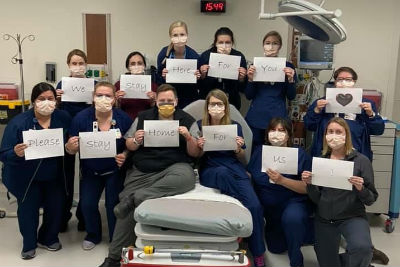By Catherine Hill, Certified Health Education Specialist
Augusta Health Community Outreach
What is social distancing?

The CDC defines social distancing as “remaining out of congregate settings, avoiding mass gatherings, and maintaining distance (approximately 6 feet) from others when possible.” The most recent recommendation is to avoid gatherings of more than 10 people.
Why is it so important to practice social distancing and to take it seriously during times like this?
COVID-19 is highly contagious and can therefore be easily spread from one person to another. When there are large gatherings, the chances of the virus spreading quickly and to many people are highly likely. Practicing social distancing helps to reduce opportunities for disease transmission; therefore, reducing the number of sick patients and decreasing the burden on health care systems and health care workers. You may have heard this as helping to ‘flatten the curve’ (see the picture below). Social distancing helps to prevent a quick spike in patients who are affected by the disease, which gives hospitals and health care workers more time to prepare and to take precautions to help protect us all.
By practicing social distancing, you are not only protecting yourself, but everyone that you could potentially come into contact with as well. Although the symptoms for coronavirus can take up to 14 days to be present, you could still be carrying the virus and could therefore be passing it on to others without realizing it. Any person of any age and health status could become infected with the coronavirus; however, the elderly and those who are immunocompromised (i.e. persons with cancer, heart disease, diabetes, and other chronic conditions) are most susceptible and would likely have the most severe side effects from the virus. By choosing to social distance yourself, you are protecting those most vulnerable populations of people as well.
Of course, there are situations in which you may not be able to social distance completely. Many people, especially health care workers, still have to go to work; people still have to get groceries for their families or go to the pharmacy to pick up prescription medications. However, if we all do our part and social distance ourselves unless it is absolutely necessary, we can help to slow the spread of this disease. This will truly be a team effort, but we are all in this together.










